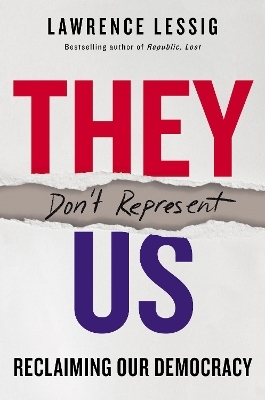
They Don't Represent Us
Reclaiming Our Democracy
Seiten
2019
Dey Street Books, an imprint of HarperCollins US (Verlag)
978-0-06-294571-6 (ISBN)
Dey Street Books, an imprint of HarperCollins US (Verlag)
978-0-06-294571-6 (ISBN)
- Titel ist leider vergriffen;
keine Neuauflage - Artikel merken
“This urgent book offers not only a clear-eyed explanation of the forces that broke our politics, but a thoughtful and, yes, patriotic vision of how we create a government that’s truly by and for the people.”—DAVID DALEY, bestselling author of Ratf**ked and Unrigged
In the vein of On Tyranny and How Democracies Die, the bestselling author of Republic, Lost argues with insight and urgency that our democracy no longer represents us and shows that reform is both necessary and possible.
America’s democracy is in crisis. Along many dimensions, a single flaw—unrepresentativeness—has detached our government from the people. And as a people, our fractured partisanship and ignorance on critical issues drive our leaders to stake out ever more extreme positions.
In They Don’t Represent Us, Harvard law professor Lawrence Lessig charts the way in which the fundamental institutions of our democracy, including our media, respond to narrow interests rather than to the needs and wishes of the nation’s citizenry. But the blame does not only lie with “them”—Washington’s politicians and power brokers, Lessig argues. The problem is also “us.” “We the people” are increasingly uninformed about the issues, while ubiquitous political polling exacerbates the problem, reflecting and normalizing our ignorance and feeding it back into the system as representative of our will.
What we need, Lessig contends, is a series of reforms, from governmental institutions to the public itself, including:
A move immediately to public campaign funding, leading to more representative candidates
A reformed Electoral College, that gives the President a reason to represent America as a whole
A federal standard to end partisan gerrymandering in the states
A radically reformed Senate
A federal penalty on states that don’t secure to their people an equal freedom to vote
Institutions that empower the people to speak in an informed and deliberative way
A soul-searching and incisive examination of our failing political culture, this nonpartisan call to arms speaks to every citizen, offering a far-reaching platform for reform that could save our democracy and make it work for all of us.
In the vein of On Tyranny and How Democracies Die, the bestselling author of Republic, Lost argues with insight and urgency that our democracy no longer represents us and shows that reform is both necessary and possible.
America’s democracy is in crisis. Along many dimensions, a single flaw—unrepresentativeness—has detached our government from the people. And as a people, our fractured partisanship and ignorance on critical issues drive our leaders to stake out ever more extreme positions.
In They Don’t Represent Us, Harvard law professor Lawrence Lessig charts the way in which the fundamental institutions of our democracy, including our media, respond to narrow interests rather than to the needs and wishes of the nation’s citizenry. But the blame does not only lie with “them”—Washington’s politicians and power brokers, Lessig argues. The problem is also “us.” “We the people” are increasingly uninformed about the issues, while ubiquitous political polling exacerbates the problem, reflecting and normalizing our ignorance and feeding it back into the system as representative of our will.
What we need, Lessig contends, is a series of reforms, from governmental institutions to the public itself, including:
A move immediately to public campaign funding, leading to more representative candidates
A reformed Electoral College, that gives the President a reason to represent America as a whole
A federal standard to end partisan gerrymandering in the states
A radically reformed Senate
A federal penalty on states that don’t secure to their people an equal freedom to vote
Institutions that empower the people to speak in an informed and deliberative way
A soul-searching and incisive examination of our failing political culture, this nonpartisan call to arms speaks to every citizen, offering a far-reaching platform for reform that could save our democracy and make it work for all of us.
Lawrence Lessig is the Roy L. Furman Professor of Law and Leadership at Harvard Law School, host of the podcast Another Way, founder of equalcitizens.us, and co-founder of Creative Commons. He clerked for Judge Richard Posner on the 7th Circuit Court of Appeals and Justice Antonin Scalia on the United States Supreme Court. Lessig has received numerous awards, including a Webby Life Time Achievement Award, the Free Software Foundation's Freedom Award, the Fastcase 50 Award, and he was named one of Scientific American's Top 50 Visionaries. He is a member of the American Academy of Arts and Sciences, and the American Philosophical Society, and the author of ten books, including Republic, Lost. He lives in Brookline, Massachusetts.
| Erscheinungsdatum | 17.10.2019 |
|---|---|
| Verlagsort | New York |
| Sprache | englisch |
| Maße | 152 x 229 mm |
| Gewicht | 493 g |
| Themenwelt | Literatur ► Romane / Erzählungen |
| Sozialwissenschaften ► Politik / Verwaltung ► Politische Systeme | |
| ISBN-10 | 0-06-294571-8 / 0062945718 |
| ISBN-13 | 978-0-06-294571-6 / 9780062945716 |
| Zustand | Neuware |
| Informationen gemäß Produktsicherheitsverordnung (GPSR) | |
| Haben Sie eine Frage zum Produkt? |
Mehr entdecken
aus dem Bereich
aus dem Bereich
wie ich versuchte, Italienerin zu werden
Buch | Hardcover (2024)
Droemer (Verlag)
CHF 35,90


